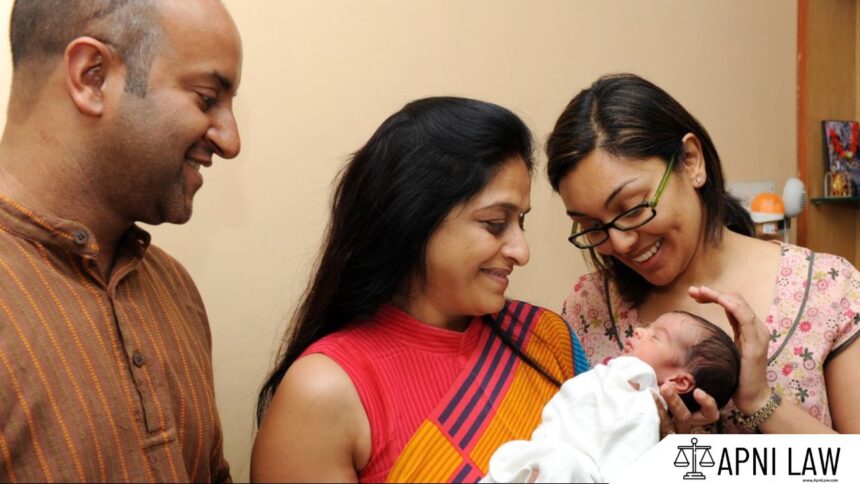This article, written by Aayushi Shukla, assistant professor and a legal expert at a law college. Take a closer look at Surrogacy Rules, recent amendments and updates. From social influences to legal safeguards, let’s explore the key aspects shaping this issue.
WHAT IS SURROGACY?
MEANING
Surrogacy is a form of third-party reproduction in which a woman consents to conceive a newborn for intended parents who cannot conceive due to medical reasons. In other words, surrogacy is a legal arrangement where a woman agrees to be pregnant and give birth to a child for another person or couple, who will become the child’s parent(s) after birth.
INTENDED PARENT
The intended parents are the individuals who will become the child’s legal guardians once born. The Act designates them as intended parents, allowing them to build their families through third-party reproduction, including egg, sperm, or embryo donation and surrogacy arrangements.
BACKGROUND: SURROGACY IN INDIA
- 1978: The roots of surrogacy in India trace back to the birth of the world’s second and India’s first IVF baby, Kanupriya alias Durga, in Kolkata on October 3, 1978.
- Surrogacy as an Alternative Reproductive Technique (ART): This breakthrough gave hope to couples facing infertility, establishing surrogacy as a viable reproductive method.
- Legalization of Commercial Surrogacy (2002): In 2002, India legalized commercial surrogacy to promote medical tourism. Due to its low costs, India became a global surrogacy hub.
- 2015 Supreme Court Case: Advocate Jayshree Wad filed a case before the Supreme Court, raising concerns over the unethical commercialization of surrogacy, leading to significant regulatory changes.
WHY DO PEOPLE OPT FOR SURROGACY?
- Infertility or past pregnancy complications.
- Medical conditions such as preeclampsia, kidney issues, or high-risk pregnancy factors.
- Women who have undergone a hysterectomy due to uterine cancer.
- Same-sex couples, single individuals, or those facing age-related pregnancy barriers.
- High costs associated with fertility treatments.
- Individuals unable to conceive naturally.
- Failed multiple IVF attempts.
TYPES OF SURROGACIES
TRADITIONAL SURROGACY
- The surrogate mother’s eggs are fertilized through Intrauterine Insemination (IUI) with sperm from a donor or the intended father.
- The intended mother does not share a genetic link with the child.
GESTATIONAL SURROGACY
- The surrogate mother carries an embryo created via In Vitro Fertilization (IVF) using eggs and sperm from the intended parents or donors.
- The surrogate has no genetic connection to the child.
LEGAL PROVISIONS RELATING TO SURROGACY IN INDIA
THE SURROGACY REGULATION BILL, 2021
1. Types of Surrogacy Under the Bill
- Commercial Surrogacy:
- The surrogate is financially compensated beyond medical and pregnancy-related expenses.
- Strictly banned/prohibited in India.
- Altruistic Surrogacy:
- A surrogate carries a child for another individual or couple without financial compensation beyond reasonable expenses.
- Permitted under Indian law.
2. Why Was Commercial Surrogacy Banned?
- Exploitation of surrogate mothers.
- Increased cases of child trafficking.
- Health risks and unethical practices in unregulated clinics.
- Mental and emotional harassment of surrogates.
3. Certification Requirements for Intended Parents
- Certificate of Essentiality:
- Issued by the District Medical Board to confirm infertility.
- Magistrate Court order for the custody of the surrogate child.
- 16-month postpartum insurance for the surrogate mother.
- Certificate of Eligibility:
- Indian citizens, married for at least five years.
- Wife’s age: 23-50 years | Husband’s age: 26-55 years.
- No surviving biological, adopted, or surrogate child (except in cases of severe illness/disability).
4. WHO ARE PROHIBITED FROM OPTING FOR SURROGACY?
- Widowers and divorced men.
- Unmarried individuals, live-in couples, and same-sex couples.
5. WHO CAN BE A SURROGATE MOTHER?
- A married woman with at least one biological child.
- Age between 25-35 years.
- Can act as a surrogate only once.
- No monetary compensation allowed.
6. WHO HAS THE LEGAL RIGHT OVER THE NEWBORN?
- The intended parents hold full legal responsibility.
- The surrogate mother has no parental rights.
- Abandoning the child is strictly illegal.
7. TERMINATION OF PREGNANCY BY SURROGATE MOTHER
- The surrogate mother has the right to undergo Medical Termination of Pregnancy (MTP) without seeking permission from the intended parents.
8. OFFENSES UNDER THE BILL
- Advertising or commercializing surrogacy.
- Exploiting surrogate mothers.
- Abandoning, exploiting, or disowning a surrogate-born child.
- Selling or importing human embryos/gametes.
- Penalties: Up to 10 years imprisonment and fines up to ₹10 lakh.
REGULATING BODIES
- National Surrogacy Board (NSB): Oversees surrogacy regulations at the central level.
- State Surrogacy Boards (SSB): Each state manages surrogacy laws at the regional level.
WHY ARE SURROGACY REGULATIONS NECESSARY?
- To prevent India from becoming a surrogacy hub for unethical practices.
- To protect financially vulnerable women from exploitation.
- To curb the influence of illegal surrogacy agencies.
- To ensure intended parents assume responsibility for the child.
WHAT ARE THE MAJOR PROVISIONS OF THE AMENDED SURROGACY RULES?
- March 2023 Amendment: Initially, only the intended couple’s gametes were permitted.
- New Amendment: One donor gamete is now allowed in cases of medical necessity, ensuring at least one genetic link between the child and the intended parents.
DRAWBACKS OF THE SURROGACY REGULATION ACT
- Excludes same-sex couples and single individuals, violating LGBTQ+ rights.
- Limits financial opportunities for surrogate mothers.
- Restricts a woman’s reproductive rights under Article 21 of the Constitution.
- Prohibiting commercial surrogacy removes a legitimate income source.
- Strict eligibility rules make surrogacy challenging for many intended parents.
- Altruistic surrogacy limits available surrogate mothers, as few relatives are willing to participate.
CONCLUSION
Surrogacy remains a vital reproductive option for many, but regulatory policies must balance ethical concerns with personal freedoms. Future amendments may offer a more inclusive and flexible framework, ensuring protection for surrogate mothers while supporting intended parents. As reproductive technology evolves, surrogacy laws must adapt to maintain fairness, transparency, and ethical considerations in India.








